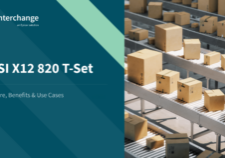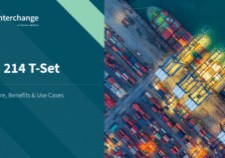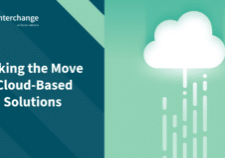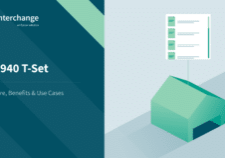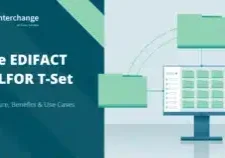How to Pick the Right EDI File Transfer Protocol
It has been shown that implementing EDI reduces error transitions by 40% and is therefore instrumental in achieving good supply chain efficiency.1 Any business with EDI implementation has important decisions regarding their file transfer protocols (FTPs), of which there are many different types. The integration of specific protocols will determine what format businesses can send and receive information in and how efficient this process will be.
Supply chains are becoming increasingly complex as organisations continue to traverse national borders due to globalisation. A recent study from Forrester revealed that the annual volume of global EDI transactions exceeds 20 billion per year and is still growing.2 Investing in a suitable FTP for your industry is therefore vital for the optimisation of data transfers and facilitation of rapid growth.
This blog will highlight how to select the most appropriate FTP for your business in order to tighten efficiency, maintain good business relationships, and satisfy the rising expectations of customers.
Suggested reading: For more information on this topic, check out our ‘Agile Supply chain’ ebook.

Choosing the right EDI protocol for you
Choosing the right EDI protocol is dependent on the industry your business operates in and whether your operation can adequately support it. Equally, a wider range of factors must be considered that include:
- Security needs
- Internal knowledge
- Software and hardware requirements
- Compliance requirements
- Ease of use
With this in mind, there are a number of FTPs that can be implemented to fit specific requirements in the list above. Let’s get into some of the benefits and use cases for each one.
AS2
Applicability Statement 2 (AS2) is designed specifically to support B2B document exchange with enhanced security systems and real-time acknowledgement and transaction capabilities. Popularised in the early 2000s by Walmart after their announcement that all their suppliers must use the communication protocol, AS2’s usage across other retailers increased rapidly.
Suggested reading: To learn about the origins of AS2 or EDI in general, take a look at What Is EDI: The History and Future of EDI.
Benefits:
Because AS2 complies with HIPAA, it’s particularly popular in healthcare. AS2 could serve you well if the following benefits are important to your business’s success:
- No limit on the size of data you can exchange
- Your AS2 connection is live for as long as your server is – useful for out-of-hours and remote operations
- Can operate point-to-point or indirectly through a VAN which enables operational versatility
- Can exchange all file formats which provides smooth EDI transactions.
- Solid security solutions due to end-to-end encryption and MDN receipts.
Drawbacks
However it is important to note the following drawbacks when considering AS2:
- Both parties must have an AS2 solution in order to exchange data.
- Someone in your organisation must be proficient in using the AS2 protocol as it can be complex to use.
Pro Tip: The amount of knowledge required to set up AS2 is daunting, but the Managed EDI Services of Data Interchange and their 35 years of expertise makes it easy for any business to adopt.
SFTP
SFTP is a network protocol that provides file access, transfer and management functionality over any reliable data stream on a remote server. It was designed as an extension to SSH2 but is usable with other protocols using stronger algorithms for the exchange of host keys and password authentication.
To sum SFTP up, it provides added functionality through enhanced security data transfer technology between remote systems: something that FTP cannot do.
Benefits:
- Boosts speed and efficiency: SFTP servers support large and bulk file transfers allowing for rapid data exchange.
- Reduces risks during data exchanges. SFTP is encrypted, requires authentication, and attends data integrity and authenticity checks to galvanise secure data exchanges.
- Powers data accessibility by satisfying user-to-server and server-to-server use cases which increases flexibility when using an SFTP client so that users may access your server remotely. Equally, you may run your SFTP server on autopilot to transfer data on pre-set schedules or in response to particular events.
- Compliant with a range of governance frameworks: many laws (such as HIPAA, SOX, EU Data Protection, etc,) require businesses to implement secure file transfers. With the robust security functions that SFTP provides, your business can streamline the attainment of these requirements.
Drawbacks:
- Binary communication that cannot be logged.
- Compatibility errors due to certain elements being optional/recommended. This may result in hold-ups where different software is used by different companies.
- SSH keys are tricky to manage and validate. SFTP requires technical upkeep measures that often require specialist intervention. Data Interchange can take this weight off your business with its extensive arsenal of EDI solutions capable of solving SFTP installation and maintenance hang-ups.
OFTP/OFTP2
There are certain FTPs that are designed specifically for certain industries, making them particularly advantageous. Take for example the Odette File Transfer Protocol, designed in 1986 for the European automotive sector. As well as remaining the default FTP for automotive supply chains, OFTP has seen usage in other sectors including retail, banking and governmental organisations. The answer to your EDI needs may reside in this FTP if your business resides in these sectors.
Enter OFTP2, the latest version of OFTP that involves the input of Data Interchange. It was written to offer a secure means of data transfer over the internet, showing the adaptability of EDI for the modern age. A detailed report of the update can be found here.
In this Volkswagen case study, we see how Data Interchange continues to be at the forefront of EDI management in the automotive industry.
Benefits:
- Data compression
- File encryption
- B2B exchange of digital receipts
- Compatible with very large files
- Offers support for additional character sets such as Chinese and Japanese.
Drawbacks:
- Integration requires a separate application
- Requires all participants to have OFTP2 capabilities
- Registration with the ODETTE organisation is compulsory
Specific knowledge of OFTP2 is needed. As mentioned, Data Interchange’s very own co-founder Phillip Friend helped develop this FTP. Combine this with their extensive knowledge of EDI solutions and you have the best option for managed EDI services on the market.
HTTP/HTTPS
Developed in 1991, HTTP established itself as one of the most popular EDI messaging protocols. Perhaps this is due to its simplicity, since all that is required to access HTTP is a web browser. This makes HTTP particularly useful for the transmission of web pages and web page components.
Benefits:
- Fewer Transmission Control Protocol (TCP) connections. Therefore HTTP offers reduced network congestion
- Offers lower CPU and memory usage thanks to fewer simultaneous connections which are beneficial for businesses with a smaller digital footprint
- Reduced latency as handshaking only takes place at the initial connection establishment stage which creates efficiency in data transmission without delays.
- Errors are reported without closing the TCP connection.
Drawbacks:
- Not optimised for mobile and therefore not aligned with the flexibility of the modern working environment
- It is too verbose. In other words, it is not user friendly
- It does not offer a reliable exchange
- It does not have push capabilities
The difference between HTTP and HTTPS
HTTPS is a secured version of HTTP that combines SSL/TLS protocols which establishes a secure connection between client and server. The data is encrypted before it is transmitted and thus it is safe throughout the connection path. HTTPS is useful when more secure transactions are needed, such as payment-type transactions.
Data Interchange helps make the right choice
Realistically when it comes to FTP selection, businesses often see the most benefits when they select a number of protocols to support end-to-end EDI integration. However, this hybrid approach to EDI often causes difficulties for in-house teams to synergise and install because of its complexity.
Outsourcing EDI management to experts such as Data Interchange will help you make the right choices and remove the pressure of implementation to ensure optimal results. Data Interchange will work closely with you to create bespoke, modern and efficient EDI solutions for your business so you can get ahead of the curve of digital commerce.
Discover why Data Interchange is the ideal provider to supply all of your EDI needs and future-proof your business by talking to an expert today.


